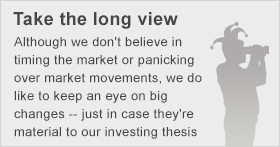
The broad-based S&P 500 (^GSPC 0.84%) soared for a second-straight session after a slew of economic data met expectations and Russian President Vladimir Putin assured the rest of the world that he had no intentions of pressing even further into Ukraine.
Three key pieces of economic data helped fuel the S&P 500's rise, including two reports from the housing industry. In what was a nice departure from the negativity witnessed last month, housing starts for February came in at a seasonally adjusted 907,000, down a fractional 0.2% from January but pretty much in line with wide-ranging estimates. Following a rapid decline in January, this stabilization helped calm the market. In addition, building permits for February surged 7.7% to a seasonally adjusted rate of 1,018,000, signaling that the homebuilding sector is still seeing strong demand amid low inventory levels.
Finally, on the economic data front, the Consumer Price Index rose by 0.1% in February, which is just what economists predicted. Some level of inflation is good since prices naturally tend to rise in an expansionary economy; however, we also don't want prices going through the roof, which is not happening in this case.
Easing geopolitical tensions also helped push the market higher as Russia's leader moved to formally annex Crimea while vowing not to seek additional Ukrainian territory. Despite this reassurance, tension in this region is still so thick you could cut it with a knife, and sanctions imposed on Russia by the United States and European Union could curb growth in Russia and across the globe.
By day's end the S&P 500 had moved decisively higher by 13.42 points (0.72%) to close at 1,872.25, less than 1% away from a record high close.
Leading the charge to the upside with a 39.3% gain, despite a lack of company-specific news, was clinical-stage cancer-focused biopharmaceutical Geron (GERN 2.27%). Despite the gain, Geron still has a long way to go to make up for its 60% nosedive last week after the Food and Drug Administration verbally told the company that it was placing imetelstat on full clinical hold due to the occurrence of persistent low-grade liver function abnormalities in its phase 2 study for polycythemia vera. There are plenty of questions for investors and the FDA right now regarding whether these liver abnormalities are reversible, and if so how that might alter the marketing of imetelstat should it be approved. The experimental therapy certainly delivered exciting results in an investigator-sponsored myelofibrosis trial from the Mayo Clinic, but until we have better clarity on the FDA's decision on imetelstat, investors should probably steer clear of Geron.
Biofuels and bio-based chemicals supplier FutureFuel (FF +2.65%) advanced 17.6% after reporting market-topping fourth-quarter results. For the quarter, FutureFuel delivered a 68% increase in revenue to $125.6 million; net income soared 327% to $26.5 million, or $0.61 per share, from just $0.15 per share in the year-ago quarter. By comparison, Wall Street had anticipated an EPS profit of just $0.23. As automakers continue to push their production away from gasoline and toward alternative fuels companies like FutureFuel could continue to see major benefits. Keep in mind that the company has little analyst coverage, so surprises to the upside and downside with regard to EPS are very likely. However, with its dividend boosted by $0.01 per quarter to $0.12 and revenue growth soaring, there's a reasonable shot that shares of FutureFuel could head even higher.
Finally, independent oil and gas exploration and production company Penn Virginia (NYSE: PVA) surged 15.6% following a 13D SEC filing in which Soros Fund Management disclosed a 9.18% active stake in the company. In the filing, Soros Fund Management noted that Penn Virginia has done a good job in running its business, but believes that, through meetings with management, it can come up with strategic alternatives to help improve shareholder value. There are a number of ways shareholder value can be improved, from stock buybacks and dividends to a potential sale of part or all of the company. It's uncertain if Soros Fund Management intends to explore any or all of these paths, but with Penn Virginia up more than 300% from its 52-week low and trading at 27 times forward earnings, that optimism may be fully baked into its shares already.








